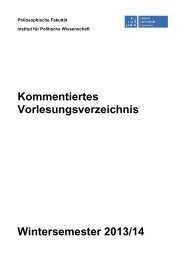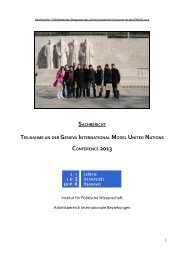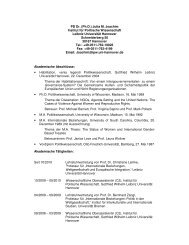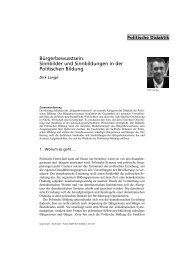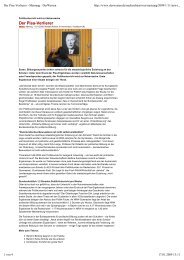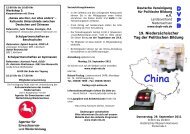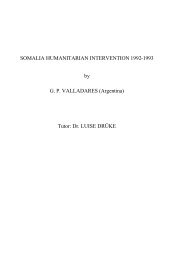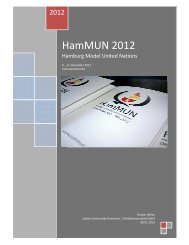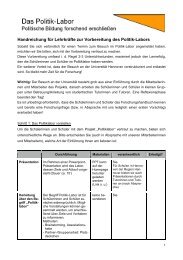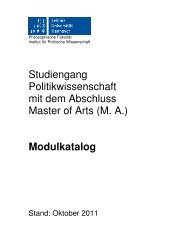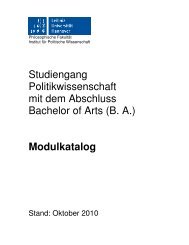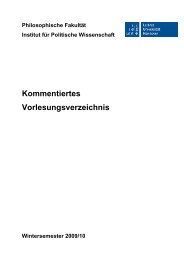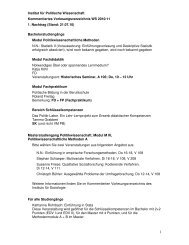Preventive Action for Refugee Producing Situations
Preventive Action for Refugee Producing Situations
Preventive Action for Refugee Producing Situations
You also want an ePaper? Increase the reach of your titles
YUMPU automatically turns print PDFs into web optimized ePapers that Google loves.
168 Chapter 4<br />
approved humanitarian operations and the setting up of Civilian<br />
Guards.<br />
Analysis of the Role of the Security Council:<br />
Despite an apparent agreement <strong>for</strong> joint action, there were differences<br />
on<br />
a number of questions including:<br />
Should sanctions have been given more time?<br />
Should Soviet peace initiative have been given more time?<br />
Should the ground war have been launched differently?<br />
Should there have been any sanctuaries?<br />
Should the Coalition <strong>for</strong>ces have attacked longer after Iraq had<br />
declared that it was withdrawing?<br />
Should the Security Council have had the right on deciding on the<br />
Kuwait-Iraq border?<br />
Should the UN really have a right to decide destroying Iraq<br />
weapons<br />
of mass destruction?<br />
The Security Council authorization of peace en<strong>for</strong>cement under<br />
Chapter VII, first with sanctions and later with the use of <strong>for</strong>ce under<br />
Article 51 were a result of special circumstances which are unlikely to<br />
be repeated. Over the past four years the Permanent Five members<br />
established a precedent of cooperation to take collective action. Iraq<br />
provided a scenario where they could act by consensus. The USA had<br />
very special relations with Saudi Arabia and had provided naval escort<br />
to Kuwaiti ships during the Iraq-Iran war. The United Kingdom also<br />
had special relations with the Gulf States, and France had special<br />
interest in questions including oil. Similarly, Japan and Germany<br />
(non-troop contributors) rely on oil from that region. Iraq had been<br />
one of the major friends of the Soviet Union.<br />
Providing humanitarian assistance to the Kurds became a special<br />
feature, which however left out the Shias in the South of Iraq. In<br />
addition, the developing United Nations system <strong>for</strong> the monitoring,<br />
collection and destruction of weapons of mass destruction was a new<br />
process, providing food <strong>for</strong> thought <strong>for</strong> the future. The Security<br />
Council, especially the Non-Aligned Movement being unprepared to<br />
authorize traditional peace-keeping under Chapter VII, the consensus<br />
remained very basic. It is likely that dealing with the internal conflict<br />
in Iraq, the Security Council will seek a broad consensual agreement<br />
of the parties<br />
concerned. 381<br />
Peace-building:<br />
New Approaches and Policies 169<br />
In his press conference on 19 March 1992 in New York, the Secretary-<br />
General defined peace-building as economic and social development and<br />
technical assistance to be given to protagonists of a dispute once peace has<br />
been attained. 382<br />
5. Funding:<br />
How much is spent on conflict prevention?<br />
Considering the purpose of the United Nations, to maintain peace and<br />
security, the whole budget does contribute either directly or indirectly to<br />
conflict prevention. 383 The General Assembly's budget appropriations <strong>for</strong> the<br />
two years 1992-1993 amounts to $2.5 billion, of which the following rounded<br />
allocations might be considered directly related to conflict prevention ef<strong>for</strong>ts:<br />
1. Overall policy-making, direction and coordination<br />
2. Good offices and peace-making; peace-keeping;<br />
Research/ collection of in<strong>for</strong>mation<br />
3. Political and Security Council Affairs<br />
4. Political/General Assembly/Secretariat<br />
5. Special political questions, regional cooperation<br />
trusteeship and decolonization<br />
6. International Court of Justice<br />
7. Human rights<br />
8. Protection of and assistance to refugees<br />
Total <strong>for</strong> 2 years 384<br />
$ 36 million<br />
$100 million<br />
$ 16 million<br />
$ 13 million<br />
$ 9 million<br />
$ 18 million<br />
$ 23 million<br />
$ 61 million<br />
$276 million<br />
____________________________<br />
381 Cf. to Peace En<strong>for</strong>cement by Major General Indar Jit Rikhye, from Notes <strong>for</strong><br />
presentation to UNITAR Seminar on Peace-keeping on 27 March 1992 in New<br />
York.<br />
382 SG/SM/4718, 19 March 1992, Transcript of Press Conference by the Secretary-<br />
General Boutros Boutros-Ghali Held at Headquarters Today, 19 March (1992).<br />
383 The General Assembly approves the regular programme budget biennially on the<br />
presentation by the Secretary-General and the review of Committee <strong>for</strong><br />
Programme and Coordination and the Advisory Committee on Administrative and<br />
Budgetary Questions.<br />
384 A/RES/46/186, 6 March 1992. Budget Appropriations <strong>for</strong> the biennium 1992-



